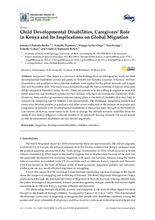Displaying 351 - 360 of 839
This webinar offers foundational information related to the intersection of culture, the migration journey, trauma and assessment.
This article focuses on the “zero-tolerance” policy adopted in spring, 2018, in the USA.
This article focuses on the “zero-tolerance” policy adopted in spring, 2018, in the USA. The implementation of this policy resulted in the forced separation of children from their families and the violation of human rights of those detained in authorized facilities and foster care.
This article will consider the extent to which the protection of child trafficking victims under the jurisdiction of the UK Modern Slavery Act 2015 is sufficient to fulfil the legal positive obligations imposed by EU Law.
This paper is a summary of the findings from an ethnographic study on child developmental disabilities conducted partly in Nairobi and Kiambu Counties in Kenya.
In this study, the outcomes of a whole-community intervention program targeted at improving the well-being of LBC and other rural children ages 7–18 were examined through a quasi-experimental evaluation.
This report outlines the barriers to settlement demonstrated by the work CCLC has done with children and young people and makes recommendations for the ways in which the government can ensure that these barriers can be overcome as the EU settlement scheme is rolled out.
As agencies consider how to build the capacity of carers to support unaccompanied young people, this study set out to learn from the experiences and views of foster carers, in order to inform the development of effective carer training and support.
This article explores the history of strained relations between the Norwegian Child Welfare Services (CWS) and various migrant groups.
This paper reports on a qualitative study that aimed to understand children’s experiences of private fostering and social work practice.


